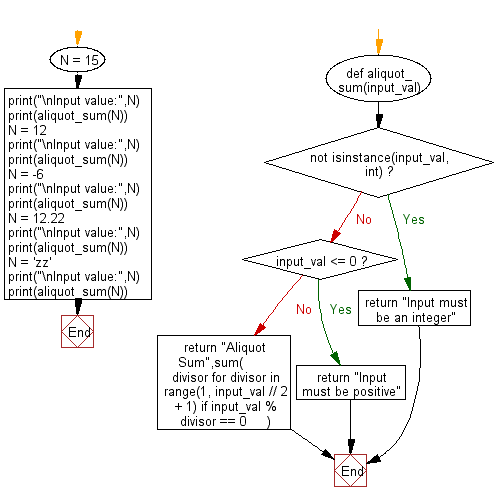Python Math: Calculate the aliquot sum of an given integer
83. Aliquot Sum Calculator
From Wikipedia, the free encyclopedia
In number theory, the aliquot sum s(n) of a positive integer n is the sum of all proper divisors of n, that is, all divisors of n other than n itself. It can be used to characterize the prime numbers, perfect numbers, deficient numbers, abundant numbers, and untouchable numbers, and to define the aliquot sequence of a number.
For example, the proper divisors of 15 (that is, the positive divisors of 15 that are not equal to 15) are 1, 3 and 5, so the aliquot sum of 15 is 9 i.e. (1 + 3 + 5).
Write a Python program to calculate the aliquot sum of a given number.
Sample Solution:
Python Code:
def aliquot_sum(input_val):
if not isinstance(input_val, int):
return "Input must be an integer"
if input_val <= 0:
return "Input must be positive"
return "Aliquot Sum",sum(
divisor for divisor in range(1, input_val // 2 + 1) if input_val % divisor == 0
)
N = 15
print("\nInput value:",N)
print(aliquot_sum(N))
N = 12
print("\nInput value:",N)
print(aliquot_sum(N))
N = -6
print("\nInput value:",N)
print(aliquot_sum(N))
N = 12.22
print("\nInput value:",N)
print(aliquot_sum(N))
N = 'zz'
print("\nInput value:",N)
print(aliquot_sum(N))
Sample Output:
Input value: 15
('Aliquot Sum', 9)
Input value: 12
('Aliquot Sum', 16)
Input value: -6
Input must be positive
Input value: 12.22
Input must be an integer
Input value: zz
Input must be an integer
Flowchart:

For more Practice: Solve these Related Problems:
- Write a Python program to calculate the aliquot sum of a number by summing its proper divisors and then print the result.
- Write a Python function that checks if a number is abundant by comparing the aliquot sum to the number, returning True if abundant.
- Write a Python script to prompt the user for a number and output its aliquot sum with appropriate error handling for negative or non-integer inputs.
- Write a Python program to iterate over a range of numbers, compute each number's aliquot sum, and then print those that are abundant.
Go to:
Previous: Write a Python program to convert a given float value to ratio.
Next: Write a Python program to get the nth tetrahedral number from a given integer(n) value.
Python Code Editor:
Have another way to solve this solution? Contribute your code (and comments) through Disqus.
What is the difficulty level of this exercise?
Test your Programming skills with w3resource's quiz.
